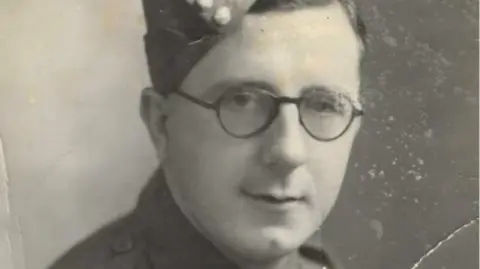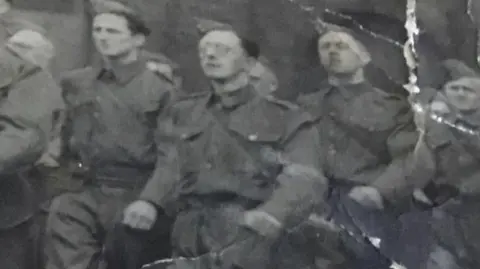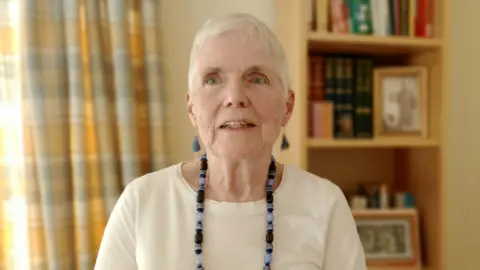'Horror of Belsen changed Dad's view on the war'
 BBC
BBCThe daughter of a British soldier who helped liberate the Bergen-Belsen concentration camp exactly 80 years ago said the "horrendous" scenes he witnessed there had changed his views about World War Two.
Gunner Herbert Hurst, from Rossendale in Lancashire, was 36 when he entered the camp in Nazi Germany on 15 April 1945.
"Before he went into Belsen, he didn't see the point of the war," explained Barbara Bell.
"But when he saw the horror there - all the naked bodies piled up - he knew Adolf Hitler had to be defeated."
Gunner Hurst, along with other members of the 63rd Anti-Tank Regiment, discovered piles of rotting corpses and thousands of sick and starving prisoners enduring the camp's filthy, severely overcrowded compounds.
"I remember Dad saying he could smell the disease miles away from the camp," Mrs Bell said.
Bergen-Belsen was originally set up by the Nazis as a prisoner-of-war and internment camp.
It was later used to house Jewish prisoners who had been transferred from across occupied Europe.
Among the tens of thousands of people who died at Belsen were the young Jewish diarist Anne Frank and her sister Margot.
They were both transferred to Belsen from Auschwitz.

Mrs Bell said that while she and her siblings knew their father had been to Bergen-Belsen, they never spoke about it with him when they were growing up.
"He never talked about it and we never asked," she said.
"But Dad kept official photographs of Belsen and the scenes are horrendous."
Later in life, though, when Mrs Bell was teaching history at Tottington High School in Bury, Greater Manchester, she persuaded him to record his memories so they could be shared with her pupils.
"It was then I discovered the full extent of all he'd suffered," she said.
"It broke my heart to hear what he had to say but I don't think he ever wanted to talk about it again."

After the war, Mrs Bell said her father returned to Lancashire to "get on with his life, his job in the shoe industry and bringing up his family".
Mr Hurst died in 1995 at the age of 86. It was just a few weeks after the 50th anniversary of Bergen-Belsen's liberation.
Mrs Bell said watching the commemorations on television had "brought everything back" to him, "all the emotion he felt in 1945".
She added: "He didn't sleep that night.
"Dad was a gentle soul and he remembered what he saw at Belsen for the rest of his life."
